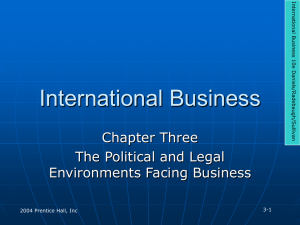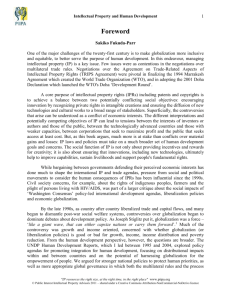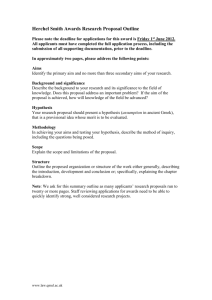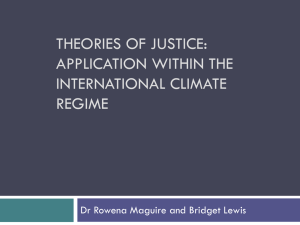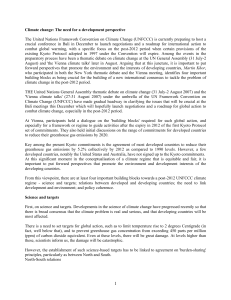US protectionism increases barriers to climate
advertisement
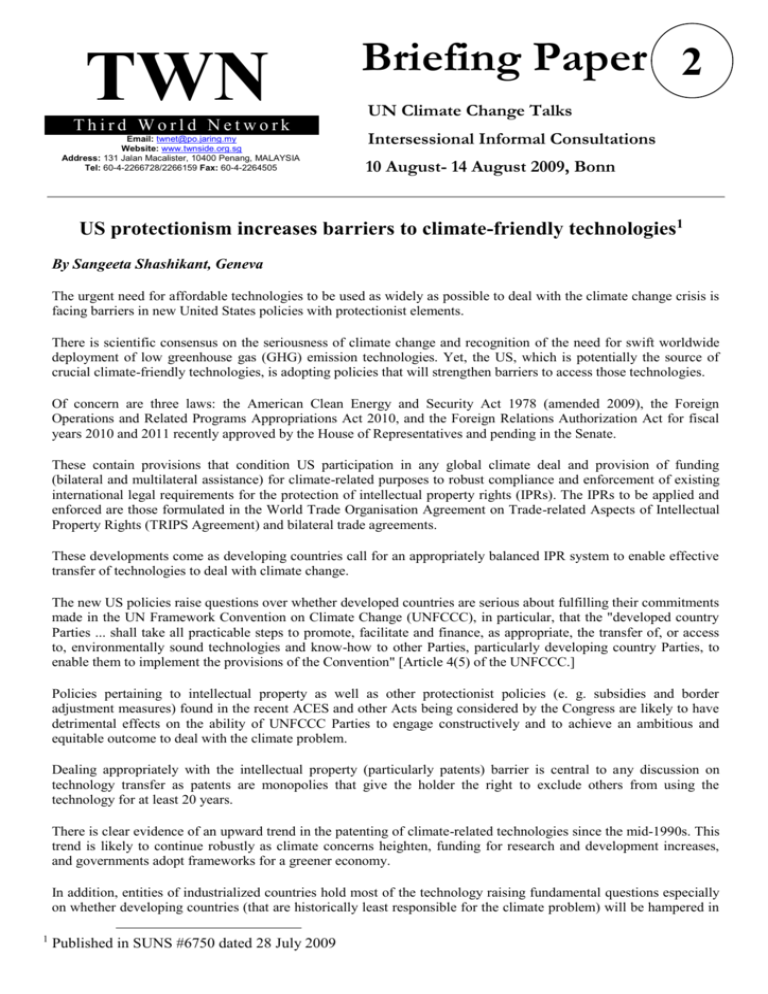
TWN Third World Network Email: twnet@po.jaring.my Website: www.twnside.org.sg Address: 131 Jalan Macalister, 10400 Penang, MALAYSIA Tel: 60-4-2266728/2266159 Fax: 60-4-2264505 Briefing Paper 2 UN Climate Change Talks Intersessional Informal Consultations 10 August- 14 August 2009, Bonn US protectionism increases barriers to climate-friendly technologies1 By Sangeeta Shashikant, Geneva The urgent need for affordable technologies to be used as widely as possible to deal with the climate change crisis is facing barriers in new United States policies with protectionist elements. There is scientific consensus on the seriousness of climate change and recognition of the need for swift worldwide deployment of low greenhouse gas (GHG) emission technologies. Yet, the US, which is potentially the source of crucial climate-friendly technologies, is adopting policies that will strengthen barriers to access those technologies. Of concern are three laws: the American Clean Energy and Security Act 1978 (amended 2009), the Foreign Operations and Related Programs Appropriations Act 2010, and the Foreign Relations Authorization Act for fiscal years 2010 and 2011 recently approved by the House of Representatives and pending in the Senate. These contain provisions that condition US participation in any global climate deal and provision of funding (bilateral and multilateral assistance) for climate-related purposes to robust compliance and enforcement of existing international legal requirements for the protection of intellectual property rights (IPRs). The IPRs to be applied and enforced are those formulated in the World Trade Organisation Agreement on Trade-related Aspects of Intellectual Property Rights (TRIPS Agreement) and bilateral trade agreements. These developments come as developing countries call for an appropriately balanced IPR system to enable effective transfer of technologies to deal with climate change. The new US policies raise questions over whether developed countries are serious about fulfilling their commitments made in the UN Framework Convention on Climate Change (UNFCCC), in particular, that the "developed country Parties ... shall take all practicable steps to promote, facilitate and finance, as appropriate, the transfer of, or access to, environmentally sound technologies and know-how to other Parties, particularly developing country Parties, to enable them to implement the provisions of the Convention" [Article 4(5) of the UNFCCC.] Policies pertaining to intellectual property as well as other protectionist policies (e. g. subsidies and border adjustment measures) found in the recent ACES and other Acts being considered by the Congress are likely to have detrimental effects on the ability of UNFCCC Parties to engage constructively and to achieve an ambitious and equitable outcome to deal with the climate problem. Dealing appropriately with the intellectual property (particularly patents) barrier is central to any discussion on technology transfer as patents are monopolies that give the holder the right to exclude others from using the technology for at least 20 years. There is clear evidence of an upward trend in the patenting of climate-related technologies since the mid-1990s. This trend is likely to continue robustly as climate concerns heighten, funding for research and development increases, and governments adopt frameworks for a greener economy. In addition, entities of industrialized countries hold most of the technology raising fundamental questions especially on whether developing countries (that are historically least responsible for the climate problem) will be hampered in 1 Published in SUNS #6750 dated 28 July 2009 their ability to gain, on reasonable terms, timely access to latest mitigation and adaptation technologies as well as associated know-how. Mark Weisbrot, an economist and co-director of the Centre for Economic and Policy Research, recently noted that "international efforts to slow the pace of worldwide climate disruption could also run up against powerful interests who advocate a fundamentalist' conception of intellectual property". He further noted that the "US Chamber of Commerce is gearing up for a fight to limit the access of developing countries to Environmentally Sound Technologies (ESTs)" as they "fear that international climate change negotiations ... will erode the position of corporations holding patents on existing and future technologies". Strong provisions on intellectual property in US policies under Congressional consideration, reflects a dogmatic protectionist agenda in favour of its corporations to the detriment of innovation and widespread dissemination of technologies that could potentially save the planet. The House of Representatives voted on 10 June 2009 to establish a new US policy that will oppose any global climate change treaty that weakens the IPRs of American green technology. The measure is part of the Foreign Relations Authorization Act (H. R. 2410) that has been referred to the Senate Committee on Foreign Relations. An authorization bill is a proposed public law that permits the federal government to carry out various functions and programs. Section 1120A of the Act states the policy regarding climate change: "To protect American jobs, spur economic growth and promote a `Green Economy', it shall be the policy of the United States that, with respect to the United Nations Framework Convention on Climate Change, the President, the Secretary of State and the Permanent Representative of the United States to the United Nations should prevent any weakening of, and ensure robust compliance with and enforcement of, existing international legal requirements as of the date of the enactment of this Act for the protection of intellectual property rights related to energy or environmental technology, including wind, solar, biomass, geothermal, hydro, landfill gas, natural gas, marine, trash combustion, fuel cell, hydrogen, microturbine, nuclear, clean coal, electric battery, alternative fuel, alternative refueling infrastructure, advanced vehicle, electric grid, or energy efficiency-related technologies". This section is in addition to other general extensive provisions about the Secretary of State ensuring the protection of the IPRs of US persons in foreign countries as a significant component of US foreign policy and for this purpose ensuring the provision of adequate resources at diplomatic missions to support enforcement action and to assist countries to reform their IPR laws. Another protectionist policy is the amendment of the American Clean Energy and Security Act (ACES) 1978 authored by US Representatives Henry Waxman and Edward Markey of the Democrat party and passed by the House of Representatives on 26 June 2009 (H. R. 2454). It is now awaiting US Senate action and adoption before it becomes US law. Extensive provisions on intellectual property are found in the Chapter on "Exporting Clean Technology". The stated purpose of the Chapter is to: (I) encourage countries to adopt policies and measures that substantially reduce, sequester or avoid GHG emissions; (ii) promote successful negotiation of a global agreement to reduce GHG emission under the UNFCCC; and (iii) promote robust compliance with and enforcement of existing international legal requirements for the protection of IPRs as formulated in the TRIPS Agreement and bilateral trade agreements. It recognizes that developing countries are historically least responsible for the cumulative GHG emissions that are causing climate change and they "lack the financial and technical resources to adopt clean energy technologies and absent assistance their greenhouse gas emissions will continue". It also acknowledges its commitment to transfer technology under the UNFCCC and the Bali Action Plan adopted by UNFCCC Parties in December 2007 which is the mandate for ongoing climate negotiations. However, it sees "Investments in clean technology in developing countries" as an opportunity to "open up new markets for United States companies" and stresses that "Any weakening of intellectual property rights protection 2 poses a substantial competitive risk to US companies and the creation of high-quality US jobs, inhibiting the creation of new green' employment and the transformational shift to the Green Economy' of the 21st Century". These provisions create a mechanism whereby allowances generated under a cap-and-trade system would be directed toward developing countries for "qualifying activities". [One allowance represents the permission to emit one ton of GHG emissions. The value of one allowance is not fixed and therefore the value of any assistance provided for under the Provisions is currently indeterminable.] The Chapter essentially is about conditions that would govern provision of bilateral and multilateral assistance, through multilateral funds or institutions pursuant to the UNFCCC such as the Global Environment Facility or an agreement negotiated under the UNFCCC. Assistance will only be provided to an "eligible" country for "qualifying" activities. An eligible country is a developing country that must have entered into an international agreement with the US to mitigate GHG emissions or have in force national policies that are capable of mitigating GHG emissions. To qualify for assistance, the activities must contribute to "substantial, measurable, reportable and verifiable reductions, sequestration or avoidance of greenhouse gas emissions". The Act then provides a non-exclusive list of activities that would be considered as qualifying activities. For distribution through an international fund or institution, one key condition is that the Secretary of State (or such other Federal Agency head as the President may designate) is required to ensure that the fund or institution contains adequate mechanisms to require that no funds are expended for the benefit of any activity that undermines the robust compliance with and enforcement of existing legal requirements for the protection of IPRs as formulated in the TRIPS Agreement. Provision of bilateral assistance is conditioned on the activity not undermining the protection of IPRs for clean technology as formulated in the TRIPS Agreement and in bilateral trade agreements. The Act also gives the President the authority to exclude otherwise eligible countries based on the degree of IPR protection in that country. The Act further contains elements on annual reporting that states that not later than 1 March 2012 and annually thereafter, the President shall submit to the appropriate Congressional committees a report on the assistance provided under the chapter. One element that will be included in the report is an assessment of whether any funds expended for the benefit of any qualifying activity undermined the protection of IPRs for clean technology as formulated in the TRIPS Agreement and bilateral trade agreements. Failure to protect IPRs sufficiently as required by the US could then result in the suspension and termination of assistance in whole or in part. The House of Representatives also approved on 9 July 2009 the Foreign Operations, and Related Programs Appropriations Act, 2010 (H. R. 3081) that in Title V provides for funds appropriated to the President for multilateral assistance for the fiscal year ending September 30, 2010. An appropriation Act authorizes the government to spend money. The Act makes available $225 million for contribution to a Clean Technology Fund and $75 million to a Strategic Climate Fund of the World Bank. While both are available only with specific authorization in another Act of Congress, in the latter case, the Secretary of the Treasury shall consult with the Committees on Appropriations on the proposed uses of these funds prior to making a contribution to the Strategic Climate Fund. However, the Act conditions transfer of funds to the World Bank on the Secretary of State certifying to the Committees on Appropriations "that all actions taken during the negotiations of the United Nations Framework Convention on Climate Change ensure robust compliance with and enforcement of existing international legal requirements as of the date of the enactment of this Act that respect intellectual property rights and effective intellectual property rights protection and enforcement for energy and environment technology, including wind, solar, biomass, geothermal, hydro, landfill gas, natural gas, marine, trash combustion, fuel cell, hydrogen, micro3 turbine, nuclear, clean coal, electric battery, alternative fuel, alternative refueling infrastructure, advanced vehicle, electric grid, or energy efficiency-related technologies". The protectionist nature of the IPR policies and other policies (e. g. subsidies and border adjustment measures) contained in the recent spate of laws being considered by the Congress threatens a positive outcome in the climate change negotiations when UNFCCC Parties meet in Copenhagen in December this year. These policies are essentially a response to recent proposals of developing countries on IPRs made in the context of the ongoing climate negotiations to enable effective transfer of technology, an obligation of developed countries under the UNFCCC. This includes a proposal by the Group of 77 and China calling for climate-friendly technologies to be excluded from patenting as well as proposals by other developing countries in their individual capacity calling for: (i) adoption of a Declaration on IPRs and Environmentally Sound Technologies in relevant fora; (ii) using to the full, flexibilities contained in the TRIPS Agreement including compulsory licensing to access intellectual property protected technologies; (iii) steps to ensure sharing of publicly funded technologies and related know-how; (iv) creation of a "Global Technology Pool for Climate Change" that ensures access to technologies including on royalty-free terms. A call to share technology has also been made by the US Energy Secretary Steven Chu. A New York Times article titled "Energy Chief Seeks Global Flow of Ideas" (March 2009) reported Chu as stating: "If countries actively helped each other, they would also reap the home benefits of using less energy. So any area like that I think is where we should work very hard in a very collaborative way - by very collaborative, I mean share all intellectual property as much as possible. And in my meetings with my counterparts in other countries, when we talk about this they say, yes, we really should do this. But there hasn't been a coordinated effort." Chu's proposal of letting ideas flow unprotected has made the industry uncomfortable and some experts view these recent policies of the US as an attempt to clarify the US position on intellectual property. Such a position will not only result in severe consequences for the widespread dissemination of present and future green technologies and the ability of developing countries to reduce emissions without prejudicing their right to development. It is also likely to have serious implications for development as well as areas ranging from medicines to arts and culture as countries are pressured to adopt higher and higher frameworks of intellectual property protection and enforcement to satisfy developed-country governments and their industry. The current US policies could also become the basis to deny developing countries the right to use existing flexibilities such as compulsory licensing, exceptions to patents etc, that are embedded in the TRIPS Agreement. Thus, it is crucial for developing countries to urgently take steps in all relevant multilateral fora but particularly under the UNFCCC to: (I) reaffirm the right to use the existing flexibilities that are available in the TRIPS Agreement to access climate-friendly technologies; (ii) reaffirm that nothing should prevent governments from taking steps to deal with the climate problem; and (iii) implement measures that would overcome barriers (including the intellectual property barrier) to effective transfer of technology for adaptation and mitigation technologies. 4


